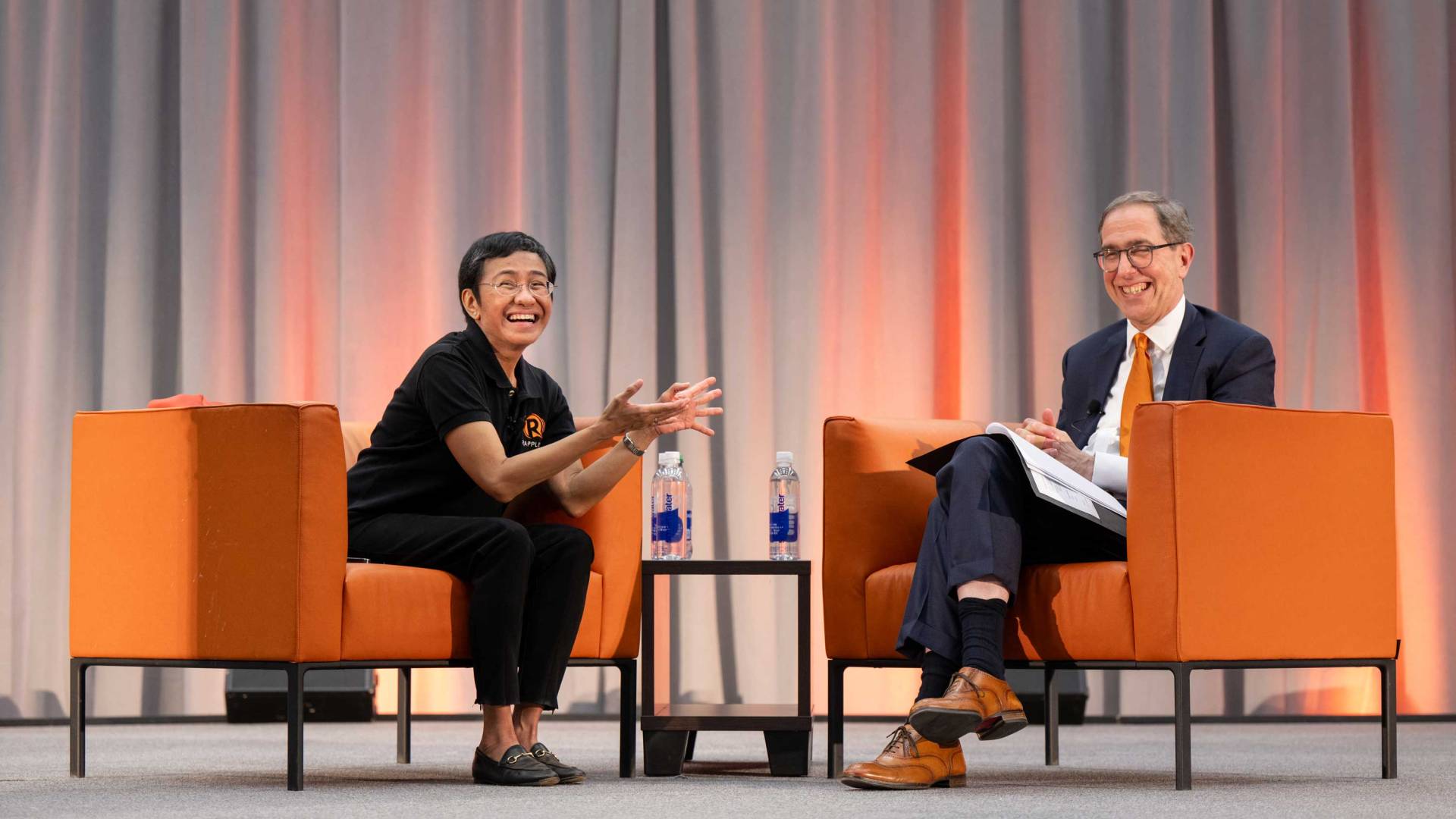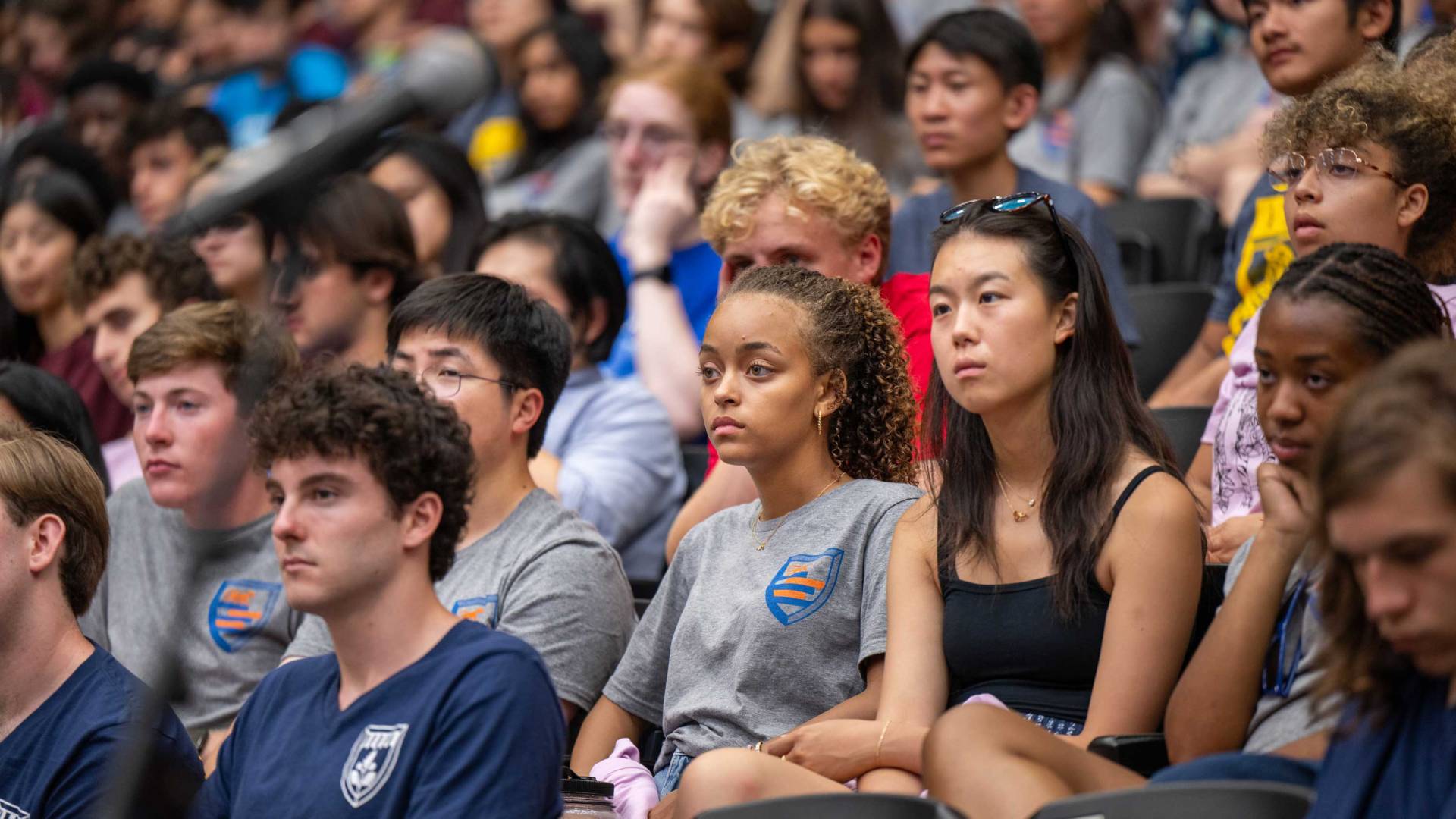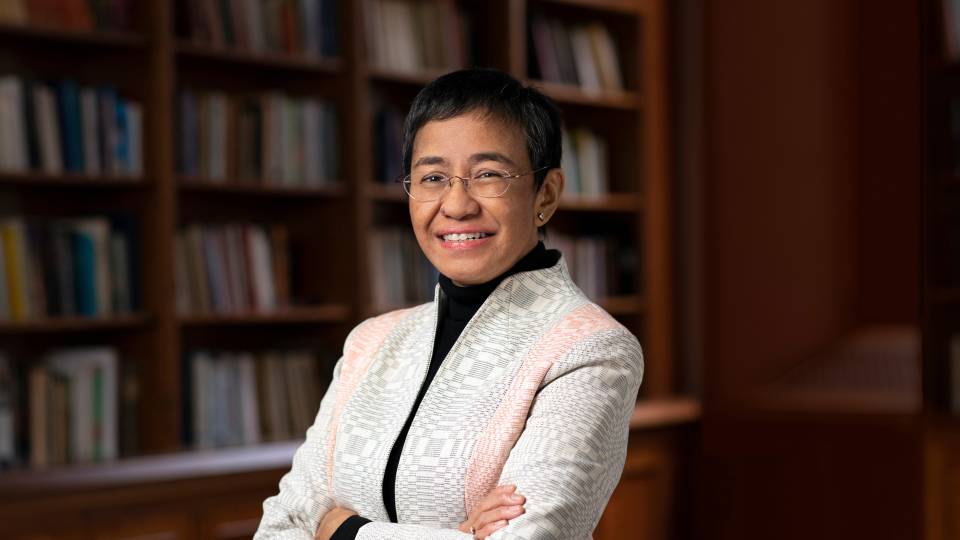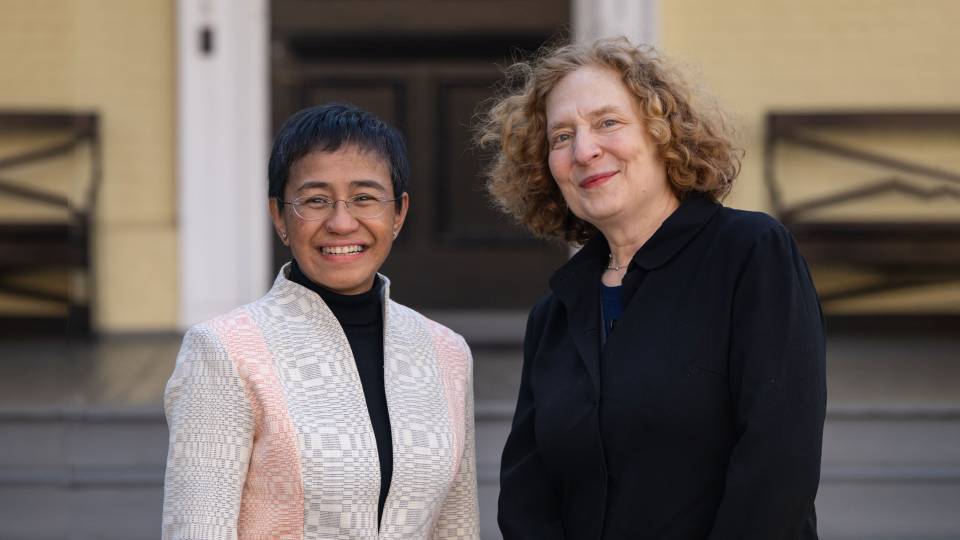Nobel Peace Prize winner Maria Ressa (left) meets with Princeton first-year students following the 2023 Pre-read assembly. This summer, the students read her book, “How to Stand Up to a Dictator.”
When they graduate, members of the Class of 2027 will enter a world utterly transformed by digital media and artificial intelligence, Nobel Peace Prize laureate Maria Ressa told the incoming students at Princeton’s Pre-read assembly. These technologies are already threatening democracy by spreading disinformation, she said — and she fears there’s worse to come.
“The entire information ecosystem will be transformed,” Ressa told the students Sunday at the assembly in Jadwin Gymnasium. “News will be transformed. How you get information will be transformed. And you’re going to be part of how we fix this.”
Ressa encouraged students to be engaged and informed consumers of information and information technology, as well as active civic participants to combat and counteract the forces that threaten democracy worldwide.
“Please redefine civic duty, civic engagement,” she implored. “What are you going to do? I think democracy is at stake. And it isn’t about one political party over another. It is a vision of the world that you want to live in. … Princeton is powerful. Harness some of that power and move forward.”

Ressa (left) spoke in conversation with President Christopher L. Eisgruber, who called Ressa “one of the world’s great advocates for free expression.”
Ressa, Class of 1986, is a longtime journalist and CEO of the Philippines-based online news organization Rappler.com. In 2021, she was awarded the Nobel Peace Prize for her efforts to safeguard freedom of expression in the Philippines.
The regime of authoritative former President Rodrigo Duterte used repeated intimidation tactics — including arrests and legal proceedings — against her and her news site after Rappler documented how social media in the Philippines was being used to spread disinformation, harass opponents and manipulate public discourse.
This summer, Princeton first-years read her 2022 book, “How to Stand Up to a Dictator,” which recounts her journey from Philippine immigrant to New Jersey resident to Princeton student to CNN reporter and Nobel laureate. At the assembly, she told them she is especially concerned about generative AI, where machines can learn about human behavior — and become better at manipulating it.
Ressa spoke in conversation with President Christopher L. Eisgruber, who called her “one of the world’s great advocates for free expression.” Eisgruber began the tradition of selecting a different book each year as a way of introducing incoming students to the intellectual life of the University. Pre-read book topics have included freedom of speech, supporting first-generation college students, and how to live a meaningful life.
The program was introduced and hosted by Dean of the College Jill Dolan.
Reinventing civic engagement
Ressa’s conversation with Eisgruber was wide-ranging, touching upon her experience at Princeton and delving into the dangerous manipulation of the truth that is enabling autocratic rulers throughout the world to be elected through democratic processes.
“If you don’t have integrity of facts, how can you have integrity of elections?” she asked.
The devices and social media that connect us can be manipulated by bad actors to modify voter behavior, she warned. Holding up her cell phone, she told the students: “You have to stop being a user of these and become a citizen. Because this is the time where we have to reinvent what civic engagement looks like in the age of exponential lies.”
Ressa said that technology companies have abdicated their responsibility to protect the public sphere, which requires all of us to be aware of how we are being manipulated.
She encouraged the students not to live performatively online, to remember “the search for meaning is actually solitary.” She also advised them, “think slow, not fast.”
‘Thinking slow is the process of democracy’
“Thinking slow is what we learn in Princeton,” she said. “Thinking slow is the process of democracy. Thinking slow is actually listening, so that you cannot just scream back, but so that you can change the way you think.”
Eisgruber noted that part of being a college student has always been about learning how to distinguish more or less reliable sources of information, and that traditionally, that was done through recognizing authorities in a library context.
“Part of our challenge as a university now, part of the challenge for any student entering in education, is to learn how to take advantage of these really powerful tools that may enable us to do things that couldn’t have been done in the past, but can also mislead, and as you say, it’s a big challenge,” Eisgruber said.
Ressa, who graduated from Princeton with a bachelor of arts in English and a certificate in theater and dance, discussed how the University’s Honor Code has influenced her thinking and actions throughout her career and adult life. She stressed the importance of the liberal arts, especially as technology fields grow.
“Be ever curious,” she said. “This is the strength of Princeton. It’s yes, we have the science, … but we also have the parts that actually connect our humanity. That’s the part that the machines can’t ever replicate.”

Following Ressa’s discussion with Eisgruber, first-years were invited to microphones set up throughout the bleachers at Jadwin Gymnasium to ask their own questions.
Up close with an icon
Students in the audience lined up at microphones in Jadwin Gymnasium to ask Ressa a range of questions about how to confront these issues.
One first-year student asked what inspired Ressa to write her book. She began writing during the COVID-19 lockdown, she said, when faced with the potential shutdown of Rappler.com and multiple criminal and civil cases against her. “When I was writing the book, I didn’t know what could happen,” she said. “The question I actually tried to answer, which is a question every reporter asked me, [was] ‘How do you find courage?’ And I kept thinking, I don’t think it’s courage.”
Ressa said it was instead her values that drove her, and she referenced an Ursula Le Guin quote that she cited in the book (with an adaptation to gender): “The truth is that as a woman’s real power grows and her knowledge widens, ever the way she can follow grows narrower: until at last she chooses nothing, but does only and wholly what she must do.”
Said Ressa: “That’s what I felt like, so I didn’t actually think it was courage. That’s why I went back to the values, because I couldn’t have done anything else and still be me.”
Following the program, Ressa remained seated at the edge of the stage in Jadwin for over an hour surrounded by dozens of students who patiently waited to take selfies, have their books signed and simply to say thank you.
They asked even more questions: What was her take on cancel culture? How might they have a worldwide impact like hers? One student asked how to fight dictatorship in his own country.
Brianna and Bethany Suliguin, second-generation Filipina twins from Toms River, New Jersey, where Ressa grew up, were especially excited to have a moment with her. “It’s kind of surreal,” said Brianna Suliguin. “I’m inspired by her.”
Students attending the Pre-read assembly included members of the Princeton Filipino Community, a student group, who took a photo with Ressa. “Even to shake her hand is such a high honor for all of us,” said Cassie Eng, Class of 2025. “We couldn’t miss this chance.”
Ressa said she was delighted by the students and their engagement with her book. She posted a photo taken from the stage of the Class of 2027 on X, the social media platform formerly known as Twitter.
“Not only did they read this, but they were extrapolating, and their questions had to do with what they were going through,” she said after the conclusion of the event. “And to be able to be helpful, at that time, that’s pretty cool.”

Ressa stayed at Jadwin for an hour after the program ended, taking selfies with students, signing copies of her book and answering questions.








